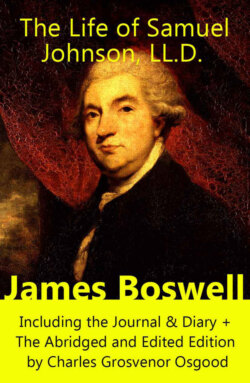Читать книгу The Life of Samuel Johnson, LL.D. - James Boswell - Страница 142
На сайте Литреса книга снята с продажи.
‘SIR,
Оглавление‘However justly you may accuse me for want of punctuality in correspondence, I am not so far lost in negligence as to omit the opportunity of writing to you, which Mr. Beauclerk’s passage through Milan affords me.
‘I suppose you received the Idlers, and I intend that you shall soon receive Shakspeare, that you may explain his works to the ladies of Italy, and tell them the story of the editor, among the other strange narratives with which your long residence in this unknown region has supplied you.
‘As you have now been long away, I suppose your curiosity may pant for some news of your old friends. Miss Williams and I live much as we did. Miss Cotterel[1093] still continues to cling to Mrs. Porter, and Charlotte[1094] is now big of the fourth child. Mr. Reynolds gets six thousands a year[1095]. Levet is lately married, not without much suspicion that he has been wretchedly cheated in his match[1096]. Mr. Chambers is gone this day, for the first time, the circuit with the Judges. Mr. Richardson is dead of an apoplexy[1097], and his second daughter has married a merchant.
[Page 370: Johnson’s visit to Lichfield. A.D. 1762.]
[Page 371: All happiness borrowed from hope. Ætat 53.]
‘My vanity, or my kindness, makes me flatter myself, that you would rather hear of me than of those whom I have mentioned; but of myself I have very little which I care to tell. Last winter I went down to my native town[1098], where I found the streets much narrower and shorter than I thought I had left them, inhabited by a new race of people, to whom I was very little known. My play-fellows were grown old, and forced me to suspect that I was no longer young. My only remaining friend has changed his principles, and was become the tool of the predominant faction. My daughter-in-law, from whom I expected most, and whom I met with sincere benevolence, has lost the beauty and gaiety of youth, without having gained much of the wisdom of age[1099]. I wandered about for five days, [1100] and took the first convenient opportunity of returning to a place, where, if there is not much happiness, there is, at least, such a diversity of good and evil, that slight vexations do not fix upon the heart[1101].
‘I think in a few weeks to try another excursion[1102]; though to what end? Let me know, my Baretti, what has been the result of your return to your own country: whether time has made any alteration for the better, and whether, when the first raptures of salutation were over, you did not find your thoughts confessed their disappointment.
‘Moral sentences appear ostentatious and tumid, when they have no greater occasions than the journey of a wit to his own town: yet such pleasures and such pains make up the general mass of life; and as nothing is little to him that feels it with great sensibility, a mind able to see common incidents in their real state, is disposed by very common incidents to very serious contemplations. Let us trust that a time will come, when the present moment shall be no longer irksome; when we shall not borrow all our happiness from hope, which at last is to end in disappointment.
‘I beg that you will shew Mr. Beauclerk all the civilities which you have in your power; for he has always been kind to me.
‘I have lately seen Mr. Stratico, Professor of Padua, who has told me of your quarrel with an Abbot of the Celestine order; but had not the particulars very ready in his memory. When you write to Mr. Marsili[1103], let him know that I remember him with kindness.
‘May you, my Baretti, be very happy at Milan[1104], or some other place nearer to, Sir,
‘Your most affectionate humble servant,
